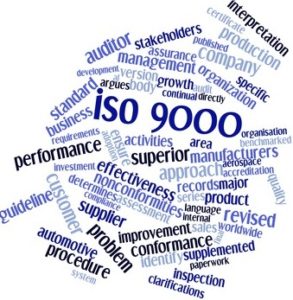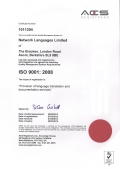The value of ISO accreditation | Network Languages

Posted on June 19, 2013 by Chris
For most companies, hiring a professional translation agency makes better business sense than having in house translators, particularly if many different languages are involved.
With so many Language Translation services on the market, choosing the right one for your needs can be a challenge, especially as measuring the accuracy and expertise of a translation is hardly an exact science. It’s no laughing matter, either, as the fallout from translation mistakes is at best embarrassing, at worst costly or even disastrous. This is where national standards and accreditations become so important, as they provide the customer with assurance that a company is aware of, and uses, quality control.
 ISO is short for the International Organization for Standardization, which is responsible for maintaining national standards across a wide range of industries, including in the localisation and translation sector. ISO does not perform certification itself, but its Committee on Conformity Assessment (CASCO) has released a number of standards that are connected to the certification process.
ISO is short for the International Organization for Standardization, which is responsible for maintaining national standards across a wide range of industries, including in the localisation and translation sector. ISO does not perform certification itself, but its Committee on Conformity Assessment (CASCO) has released a number of standards that are connected to the certification process.
Most relevant to the translation sector is ISO 9000, which deals with the basics of quality management, including the eight management principles on which the family of standards is based.
If a translation firm states that it is an ‘ISO 9001:2008 accredited company’, this means that a third party has provided independent confirmation that the organisation meets the requirements of ISO 9001.
The ISO accreditation is intended to show that there is a quality policy in place within the company and that it is understood and followed at all levels and by all employees. Employees work towards measurable objectives and quality is regularly audited and evaluated for conformance and effectiveness.
This kind of quality control is important for translation agencies and language specialists to ensure a level of conformity across translators and proofreaders. Customers need assurance that the translations they receive meet the high standards they expect and have been correctly translated: that lazy, sloppy translations are not acceptable, and that all translators are aware not only of both source and target language, but also of the cultural context of the language they are translating from as well as into. In addition, they want a guarantee that translators possess a solid understanding of the subject matter, and finally, that the material they have handed over will be treated as confidential and, if necessary, that all translators have signed a Non Disclosure Agreement.
Another form of accreditation is undertaken by the United Kingdom Accreditation Service, UKAS. This is also performed by a third party.
Human translation will always be superior to machine translation because human, native translators understand the cultural nuances. There is however no primary governing body over the translation and localisation industry, so certification like ISO 9001:2008 is important to keep customers assured that the firm they have chosen does have internal quality assurance procedures in place and that translators are suitably qualified and experienced. It is not firm proof of Language Translation Excellence, but in an ever-expanding market, it can be a decisive factor.
Network Languages is one of the few translation companies who have been independently audited and accredited with the full ISO9001:2008. This is a very tough and detailed process so don’t be fooled by companies who claim to be “certified” or “registered” ask to see their accreditation certificate.
You deserve REAL language translation by experts who are committed to quality and service. Call (+44) 1344 870700, Like our Facebook page, subscribe to our Twitter feed, or email your requirements to us today.




